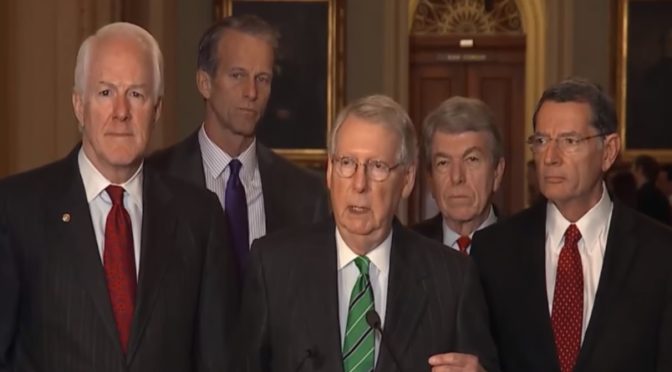Look, I get it.
It’s been a raucous year for American “Politics”. Or maybe we’re better off just calling it “Political Theater” in the era of Trump. Every single day there is a new outrage, a new something to be mad about, scared of, or perpetually annoyed. Seriously, I get it… 2017 has been a traumatic experience for us all.
But here’s the deal folks… it ain’t over yet. After a whole year of drama, the Republican-dominated Congress is now feeling the pressure to pass some sort of “Tax Cut/ Tax Reform” bill so that they will have a legislative accomplishment to tout on the 2018 campaign trail. And let’s just say, the desperation is palpable. They are willing to pass ANY bill that they can, even if it doesn’t help simplify the tax code, even if it doesn’t pay for itself, and even if it’s a disaster. Beyond cutting taxes and ballooning the deficit, the Senate version of the “Tax Bill” will also have wide-ranging consequences for the nation’s healthcare system. Here’s more from Sarah Kliff of Vox…
The Senate tax bill is really a health care bill with major implications for more than 100 million Americans who rely on the federal government for their health insurance.
The bill reaches into every major American health care program: Medicaid, Medicare, and the Obamacare marketplaces.
These are expected outcomes based on two significant policy changes in the bill. First, the bill repeals the individual mandate, a key piece of Obamacare that requires most Americans get covered. Economists expect its elimination to reduce enrollment in both the Affordable Care Act’s private marketplaces and Medicaid by millions. The money saved will be pumped into tax cuts for the very wealthy.
For those wondering, yes it is true that this bill does not explicitly say that Medicare will be cut, but those cuts are implied by the bills sequestration– across-the-board cuts that would be triggered by deficit spending (thanks to the aggressive tax cuts). Here’s more on that from Niv Elis of The Hill…
The GOP tax bill could trigger automatic cuts worth $136 billion from mandatory spending in 2018, including $25 billion in Medicare cuts, if Congress doesn’t find another way to offset its deficit increases, according to the Congressional Budget Office (CBO).The tax bill would add an estimated $1.5 trillion to the deficit over a decade. Congressional “pay-as-you-go” rules, called pay-go, require that the White House Office of Management and Budget (OMB) automatically cut mandatory spending if legislation increases the deficit beyond a certain point.“Without enacting subsequent legislation to either offset that deficit increase, waive the recordation of the bill’s impact on the scorecard, or otherwise mitigate or eliminate the requirements of the [pay-go] law, OMB would be required to issue a sequestration order within 15 days of the end of the session of Congress to reduce spending in fiscal year 2018 by the resultant total of $136 billion,” CBO wrote on Tuesday.Medicare can only be cut by a maximum of 4 percent through the pay-go rules, however, which amounts to $25 billion in cuts.
